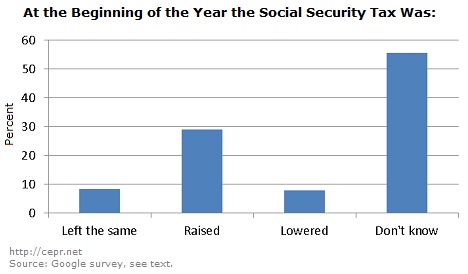October 21, 2013
Most discussion in Washington of the projected long-term shortfall in the Social Security trust fund assumes that we can never raise the payroll tax. Many have advocated raising the cap on wages subject to the tax (currently just over $113,000), but raising the tax rate itself has largely been out of the question.
While there are good arguments for raising the cap (the increase in the share of income going over the cap due to the upward redistribution of income is a major reason for the projected shortfall), it is not obvious why increases in the tax rate at some future date should not be considered.
The Social Security Trustees projects that the average wage will be more than 60 percent higher in 2050 than it is today. Would there be some serious generational injustice if the tax rate was 2-3 percentage points higher at that point? This would still leave the after Social Security tax wage more than 50 percent higher than it is today.
Of course most workers have seen little or none of the benefits from the economy’s growth over the last three decades. The increase in average wages is overwhelmingly due to an increase in wages in the top 10 percent of the workforce and especially the top 1.0 percent. The big gainers have been CEOs, Wall Street types and doctors (especially specialists). If the next forty years are like the last three decades, then any increase in the Social Security tax will be bad news for most workers.
But this is really a problem of upward redistribution of wage income, not a problem of Social Security. If we stop pursuing trade, labor, and macroeconomic policies that have the effect of redistributing income upward, then it is difficult to see the problem with phasing in modest increases in payroll taxes.
While the conventional view in Washington is that voters would never tolerate an increase in payroll taxes under any circumstances, there is reason to question this view. CEPR arranged a Google poll that asked a simple question: “At the beginning of 2013, the payroll that funds Social Security was… .” Respondents were offered the choices of raised, lowered, left the same, don’t know.
Here’s the reponse (n = 1534)

Remember, at the beginning of the year the payroll tax was raised by 2 full percentage points as the 2-year payroll tax holiday ended. Yet, only 28.9 percent of respondents were able to recognize this rise in taxes.
This sort of rapid single year rise in payroll taxes is not desirable nor do the projections imply such an increase would be necessary. Suppose instead that we raise the tax by 0.1 percentage points annually (0.05 percentage points on both the employee and employer) for twenty years. If we have created an economy in which ordinary workers share in the gains of economic growth this would mean that after-Social Security tax wages will rise by roughly 1.2 percentage points annually instead of 1.3 percentage points. Will this be an intolerable burden for voters?
Again, the clause “if we have created an economy in which ordinary workers share in the gains of economic growth” is a huge “if.” But this just highlights the fact that the battle over Social Security unavoidable gets us back to the question of inequality. If we have an economy in which all are benefiting then covering the costs of workers’ retirement is not a big deal. If the gains from growth continue to go almost exclusively to the rich, then ordinary workers will have difficulty funding their retirement, just as they will have difficulty meeting other expenses during their working years.






